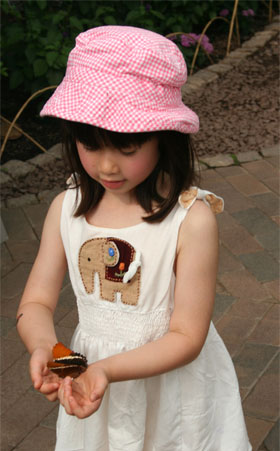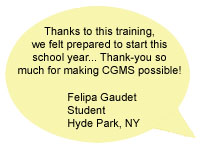|
|
| (A Montessori quick bite from The Center for Guided Montessori Studies) |
|
Adults enjoy more freedoms than children. We can eat ice cream when we want. We can stay up as late as we wish. We can watch TV until our eyes fall out. We may choose to quit an unsatisfying job, or to move to a better house. We may choose to do more of the things that we enjoy, some of which may not be good for us. The freedom to do what we want carries with it the burden of making good choices. How do we prepare children for this freedom? Let’s consider this example. The girl will tell you she’s four and a half, and that’s a very important distinction to her. Her brow is creased in concentration as she leans over a rug on the floor. Spread out below her are eight cards, four pairs of opposites which she is trying to organize and label. She’s having trouble. She sounds out the labels again – Up, Down, Big, Little, Dark, Light, Hot, Cold. She knows these words. But something isn’t right. At home, she’s learned to expect her helicoptering father every time she hits some difficulty. Her challenges are his anxiety – he worries that she’ll become too frustrated and turned off from harder tasks. Just yesterday she was doing a puzzle and he pointed out where a missing piece went. “I can do it, Daddy!” she tells him time and again. But he distrusts the look of concentration on her face, and finds it very difficult not to offer unsolicited hints. She is not quitting. “Up” and “Down” were easy peasy. There’s a picture of a funny little man running up or down the stairs on each card, she can tell which way he is going because of the way he faces. The picture of the ice cube, she knows that has to be “cold.” And the opposite of that has to be the “hot” grill. She knows grills are hot, she’s been told that many times when her parents are cooking out back. She must have cold and hot right. She turns the cards over, and sure enough they have the same color dot on the back. But something is wrong with the other opposite cards. She doesn’t know it, but in a traditional classroom there probably wouldn’t have been that dot on the back of the card. Such a little thing. Such a world of difference. In a traditional “preschool” or daycare setting the girl would be expected to raise her hand and wait for an adult – hopefully wise, hopefully friendly, but always busy – to find the time to come over and give her a hand. How can a child learn unless she is taught? Both the lighthouse and the boat are big, but the lighthouse is bigger. Both pictures had sand, but look, there’s a picture of a toy boat too. It makes more sense for the boats to be “big” and “little”. Her eyes widen and she relaxes. She sees her mistake; the picture for “dark” must be the lighthouse at night. She wasn’t sure because it was a silhouette, and there’s more water in that picture. But if she does it this way then the boats can go together and the lighthouses can go together. She arranges the cards and puts their labels underneath. She’s almost sure she has it right now. It all makes sense. She flips all the cards and sees that, yes, the color coding all matches. Satisfied, she completes the work. She randomizes the cards to make the work fun for the next child, and returns it to its shelf. Children are people, and people make mistakes. Unlike mainstream pedagogy, in Montessori we cherish children’s freedom to make – and correct – their own mistakes. We call this process “control of error”, and it is built into every Montessori work. When a Montessori teacher introduces a child to a new activity, the lesson includes the tools the child needs to perform a self evaluation. But why is this so important? This is the question we ask today. Dr. Montessori discovered a secret. This is the secret that the authoritarians of the world desperately hope will never become common knowledge. The secret is that we are all ready for freedom. We always have been. We are not individuals without it. To rob a person’s freedom is to reduce their humanity, to treat them as puppets. If we cherish our society’s freedoms, we must respect the individual. Dr. Montessori realized that respecting the child meant acknowledging their person-hood. For this reason she designed classrooms that afford children freedom of choice and freedom of movement. How can you be free without the ability to make meaningful choices? How can a school help prepare children for the freedom of adulthood without granting them the experience of freedom? Of course freedom also means the capacity to act in error. Authoritarians shudder, imagining that left to their own devices children will do nothing productive and cause no end of trouble. Of course, this is not what we see. Dr. Montessori said that the work of children was to create the people they will become, and we find that they pursue this task with marvelous diligence. But children do make mistakes – errors in movement, academic errors, and errors in judgment. It is the goal of the Montessori method to assist children to recognize and to resolve their errors on their own. For children are not malfunctioning machines for us to “correct” – they are people and deserve the dignity of discovery and self-correction. Humans learn from their mistakes, so we must permit children to make them. The Montessori materials are designed at their core to incorporate this concept. Every work a child performs includes a tool for control of error. The idea is that a child’s engagement with the material should be sufficient for self-learning, rather than requiring the adult in the classroom to pass judgment. Not all of the learning in the Montessori classroom is academic. In the social environment, too, we celebrate freedom. Interpersonal conflict is a challenge for children and adults alike, and the Montessori classroom offers both the freedom for these conflicts to arise, and an environment uniquely well suited to solving problems harmoniously. Activities such as a peace table or grace and courtesy lessons are all designed to give children the tools they need to understand themselves, each other and to learn to resolve these conflicts when they arise. Outsiders often remark that Montessori children seem so mature “for their age”, and this may be one reason why. Science shows us that emotional intelligence (EQ) is a better predictor for success than any academic measure. The Montessori classroom is designed to give children a special environment in which to strengthen these emotional skills. Dr. Montessori’s secret is that freedom, independence and dignity are all interrelated. Aging adults often resent the loss of independence represented by moving into an assisted living facility. Both the aged and infirm say they hate “being treated like children.” Children hate being treated like children, too, because the way children are traditionally treated interferes with their need for freedom and independence. The safe prepared environment of the Montessori classroom affords children the freedom to correct their own errors, develop their individuality, and mature into the adults our society needs. Thoughts for the day:
CGMS has applied for accreditation of its online Elementary Full Certificate course with residential seminar locations in Indiana, Florida and New York from the Montessori Accreditation Council for Teacher Education (MACTE). Our Primary Full Certificate program with residencies in Sarasota, Florida and Kingston, NY, is already accredited by MACTE. We have also applied for accreditation of the additional early childhood location in Indianapolis.
To learn more about our teacher certification programs, please email us or visit our website at http://www.guidedstudies.com/montessori-certification-online.html.
|
 “It is a commonplace that the child must be free. But what kind
“It is a commonplace that the child must be free. But what kind
 Our next
Our next
Leave a Reply